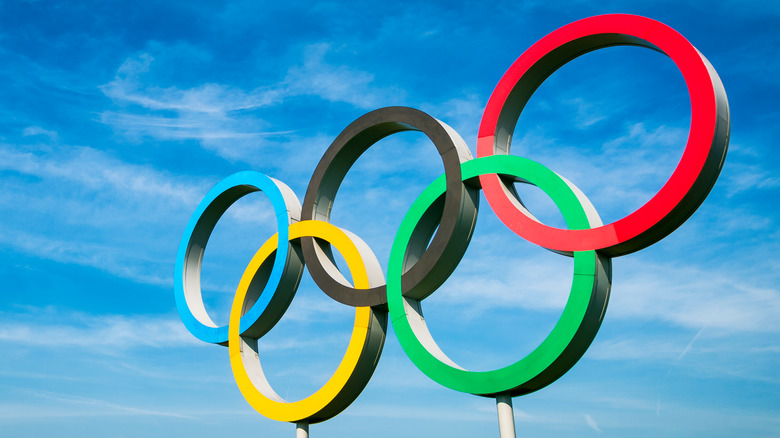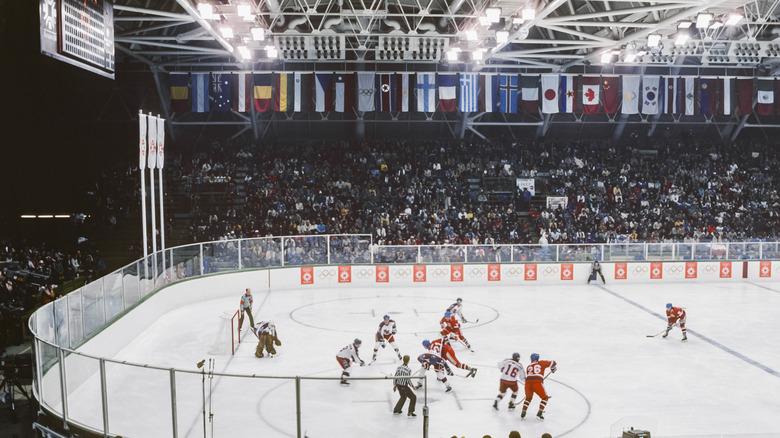The Three Olympic Games That Have Been Held In Countries That No Longer Exist
Hosting the Olympics is often used as a way for a country to give their economy a nice shot in the arm, to show off to the rest of the world all that they have to offer, and in some cases, to sweep less desirable deeds under the proverbial rug. It could even be argued that in hosting both the 2008 Summer Olympics and the 2022 Winter Olympics, China managed to check all three of those boxes in one way or another in just the last two decades.
Being named the host nation for an Olympic Games also puts a country under a microscope and sometimes the games' success hinges on its ability to navigate through a gauntlet of controversy. That's why some have called the 2000 Summer Games in Sydney the most successful modern Olympics. It was practically devoid of controversy and featured 34 new world records being set.
Hosting an Olympics Games is a high-risk, high-reward venture that costs copious amounts of money with the prospect of boosting economies or tourism industries. Of course, hosting an Olympics still doesn't guarantee long-term prosperity, as there are other geopolitical factors at play, This is why three nations that previously hosted the Olympic Games are no longer on the map — unless your map is very outdated.
West Germany - Munich 1972
The 1972 Summer Olympics in Munich, West Germany are best remembered for two things; one good, one tragic. The good was when United States swimmer Mark Spitz won his seventh gold medal of the Games, a record that stood until 2008 when Michael Phelps took home eight gold medals at the Beijing Summer Olympics (via History).
These games were marred by a horrific incident in which terrorists who were members of a Palestinian militant group known as Black September broke into an apartment where members of the Israeli athletes were staying, per Britannica. They took nine hostages, all of whom were eventually killed. Meanwhile, Mark Spitz — who is Jewish — was escorted by armed guards out of West Germany to safety in London.
The Games' host nation of West Germany — officially known as the Federal Republic of Germany — was formed after World War II when Germany was divided into two different countries. According to History, this is how it stayed for just over 40 years until the collapse of the Soviet Union allowed Wast and West Germany to reunite once again into one nation.
USSR - Moscow 1980
Being such a high-profile event where most of the world congregates for two weeks to celebrate the best athletes in the world, it's hard — if not impossible — to keep politics out of the games. The 1980 Winter Games in Lake Placid and Summer Games in Moscow took place at the height of the Cold War, and every competition between the Americans and the Soviets had a little extra spice to it. Look no further than the Miracle on Ice for how important these matchups were.
However, any fans hoping to see a summer version of the Miracle on Ice were disappointed going into the 1980 Summer Games in Moscow. According to the Olympics, U.S. President Jimmy Carter led the boycott as a way of condemning the Soviet Union's decision to invade Afghanistan in late 1979. Other nations were supportive of the boycott but still allowed their athletes to attend the games if they wanted to. According to History, the Soviets returned the favor in 1984 when they chose to boycott the Summer Games in Los Angeles, citing concerns about their athletes' safety.
The Soviet Union barely made it out of the 1980s. On Christmas Day 1991, the Soviet Union was broken up, and in its place was a collection of new, separate nations (via U.S. Department of State).
Yugoslavia - Sarajevo 1984
While the 1984 Summer Olympics in Los Angeles got a lot of attention for the Soviet boycott, earlier in the year, the world gathered in Sarajevo, Yugoslavia for the 1984 Winter Olympics. According to the Olympics, the Sarajevo Games went off without a hitch, and no one in attendance would have had any idea that just eight years later, the nation of Yugoslavia would be ripped apart by war.
The Soviets led the games in total medals at the 1984 Winter Games with 25, while the German Democratic Republic — also known as East Germany — won the most gold medals with nine and a total medal count of 24. The United States finished fifth in the medal tally with eight, behind Finland and Norway, which had 13 and nine total medals, respectively.
After the high point of hosting the Olympics, things quickly took a turn for the worst in Yugoslavia. The nation had been around ins some form or another since the late 1920s, but amid economic tensions within Yugoslavia, the nations of Slovenia and Croatia seceded. This led to others nations doing the same and was followed by civil war and a Serbian ethnic cleansing campaign. In 2003, what was left of Yugoslavia was renamed Serbia and Montenegro (via Britannica).



